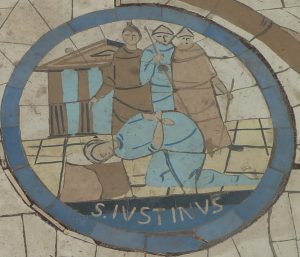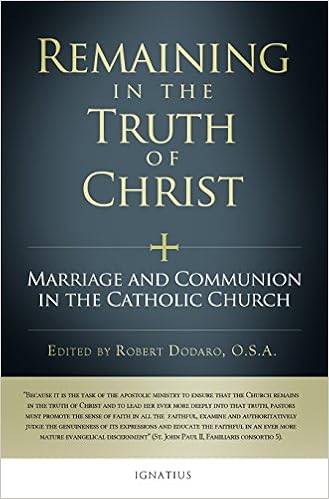 A reading from the first apology of Justin Martyr in defense of the Christians, c. 100-165
A reading from the first apology of Justin Martyr in defense of the Christians, c. 100-165
No one may share in the Eucharist except those who believe in the truth of our teachings and have been washed in the bath which confers forgiveness of sins and rebirth, and who live according to Christ’s commands.
For we do not receive this food as ordinary bread and as ordinary drink; but just as Jesus Christ our Savior became flesh through the word of God, and assumed flesh and blood for our salvation, so too we are taught that the food over which the prayer of thanksgiving, the word received from Christ, has been said, the food which nourishes our flesh and blood by assimilation, is the flesh and blood of this Jesus who became flesh.
The apostles in their memoirs, which are called gospels, recorded that Jesus left them these instructions: he took bread, pronounced the prayer of thanksgiving, and said: “Do this in memorial of me. This is my body”.
In the same way he took the cup, pronounced the prayer of thanksgiving, and said; “This is my blood”, and shared it among them and no one else.
From that time on we have always continued to remind one another of this.
From Pope St. John Paul II’s Post-Synodal Apostolic Exhortation Familaris consortio 5 cited in Remaining in the Truth of Christ (aka The Five Cardinals Book™):
Because it is the task of the apostolic ministry to ensure that the Church remains in the truth of Christ and to lead her ever more deeply into that truth, pastors must promote the sense of faith in all the faithful, examine and authoritatively judge the genuineness of its expressions and educate the faithful in an ever more mature evangelical discernment.
From Pope Benedict XVI’s 2007 Post-Synodal Apostolic Exhortation Sacramentum caritatis, in the section on “The Eucharist and the indissolubility of marriage” (29 ff.) cited in Remaining in the Truth of Christ (aka The Five Cardinals Book™):
[O]ne should begin by assuming that the fundamental point of encounter between the law and pastoral care is love for the truth: truth is never something purely abstract, but a real
part of the human and Christian journey of every member of the faithful. Finally, where the nullity of the marriage bond is not declared and objective circumstances make it impossible to cease cohabitation, the Church encourages these members of the faithful to commit themselves to living their relationship in fidelity to the demands of God’s law, as friends, as brother and sister; in this way they will be able to return to the table of the Eucharist, taking care to observe the Church’s established and approved practice in this regard. This path, if it is to be possible and fruitful, must be supported by pastors and by adequate ecclesial initiatives, nor can it ever involve the blessing of these relations, lest confusion arise among the faithful concerning the value of marriage.




























The Ruthenian Prayer Before Communion captures this sentiment beautifully:
O Lord, I believe and profess that You are truly Christ, the Son of the living God, Who came into the world to save sinner, of whom I am the first. Accept me as a partaker of Your mystical supper, O Son of God; for I will not reveal Your mysteries to Your enemies, nor will I give You a kiss as did Judas, but like the thief I confess to You:
Remember me, O Lord, when You shall come into Your kingdom.
Remember me, O Master, when You shall come into Your kingdom.
Remember me, O Holy One, when You shall come into Your kingdom.
May the partaking of Your Holy Mysteries, O Lord, be not for my judgment or condemnation, but for the healing of soul and body.
O Lord, I also believe and profess that this, which I am about to receive, is truly Your most precious Body and Your life-giving Blood, which I pray, make me worthy to receive for the remission of all my sins and for life everlasting. Amen.
O God, be merciful to me, a sinner.
O God, cleanse me of my sins and have mercy on me.
O Lord, forgive me, for I have sinned without number.
No one may share in the Eucharist except those who believe in the truth of our teachings…
Modern Catholics, including popes, have been contradicting the above for quite awhile.
Non Catholics do not “believe in the truth of our teachings,” at least with regard to some of those teachings, and yet they are permitted to receive the Holy Eucharist under certain circumstances.
Pingback: “No one may share in the Eucharist except those who believe in the truth of our teachings…” | Fr. Z’s Blog | Deaconjohn1987's Blog
“objective circumstances make it impossible to cease cohabitation”
This is worded horribly. It is never “impossible” to cease cohabitation.
Better were it worded: “objective circumstances make it ‘heroic’ to cease cohabitation”
In my mind, it seems safer for souls that the brother/sister solution be acknowledged as a “lesser of two evils” option. Is it any mercy to allow these couples to reach their Judgement and be flabbergasted when the Lord asks them, “Where is your spouse?”, because they have not held their true spouses in their hearts since their civil divorces?
Which makes me wonder: when a couple asks for the brother/sister option, does any priest think to require, as part of this mercy, that they pray for the abandoned (or unfaithful) true spouse(s) each time they receive Holy Communion?
If Holy Mother Church does not challenge us to holiness, who will?
DJAR, there is no contradiction.
The cases are with people in True Churches which profess belief in the Catholic faith and and have no other recourse to the sacraments and with Christians of ecclesial communities which are near the point of death and profess belief in the Catholic faith, and presumably would convert if they survived the present circumstances. Granted one might say, if the member of the non-Catholic True Churches believe in the Catholic faith, why wouldn’t they convert? Unfortunately, imperfect communion between autocephalous Orthodox Churches is so common that many Orthodox don’t see the Catholic-Orthodox split and all that different so there’s no point in converting.
Anilwang,
Canon 844.4 of the 1983 Code of Canon Law reads, “If the danger of death is present or other grave necessity, in the judgment of the diocesan bishop or the conference of bishops, Catholic ministers may licitly administer these sacraments to other Christians who do not have full communion with the Catholic Church, who cannot approach a minister of their own community and on their own ask for it, provided they manifest Catholic faith in these sacraments [Penance, Eucharist, and Anointing of the Sick] and are properly disposed.” This portion of Canon 844 allows instances of inter-communion with non-Catholics in general, which is not limited to the schismatic Orthodox Churches. Since Canon 844 permits inter-communion with non-Catholic Christians in the modern Catholic Church any further reform in the area of inter-communion by Pope Francis is one of degree, not an essential change. This also contradicts the assertion of others that the modern Catholic Church rejects inter-communion with non-Catholic Christians, when she actually accepts it in a limited manner. In relation to DJAR’s point, the Catholic Church rejected inter-communion in the time of St. Justin Martyr until after the Second Vatican Council and past Catholics would interpret the new discipline as a contradiction to prior statements and disciplines.
Also, “non-Catholic True Churches” is a misnomer since any church that is not the Catholic Church is outside the Mystical Body of Christ and is certainly not a “true Church.”